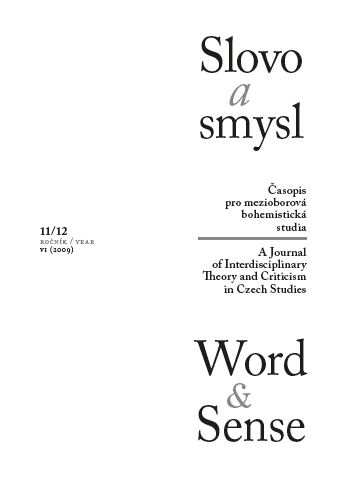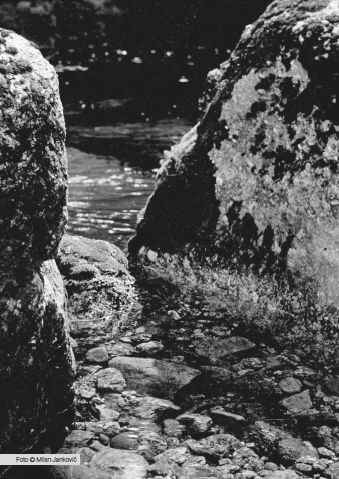Editorial
The double issue 11–12 straddles the line between the natural sciences and the humanities. These two disciplines are too often unnecessarily opposed to one another in the contemporary academic and especially the official world, particularly for practical purposes, although their intersecting intellectual and conceptual points of departure are in the long term undoubtedly mutually inspiring. The present double issue of Word and Sense will, of course, do little to remedy this situation, created to a significant extent by bureaucracy. Nevertheless – as one of the contributors to this issue, the well‑known Dutch scholar Mieke Bal, states in the introduction to her book Travelling Concepts – efforts to reflect upon the given problem in a responsible way can “pave the way to a more nuanced academic environment.” In order to chart connections between the disciplines, we first looked to the past. At the same time, we have sought out contemporary efforts to integrate the approaches of the humanities and the natural sciences. Inspired by Mieke Bal, we wish to illustrate that it is not so much methodology that can be transferred from one field of the natural sciences or the humanities to another, but concepts or shared conceptual frameworks, or at least frameworks that can be adapted from one field to another. We have thus attempted to bring together new views in which literature meets the natural sciences and is confronted with their discoveries, and, on the other hand, the natural sciences seek inspiration in the realm of art and scholarly reflections on art. In their heteroglossia they thus partake in the creation of the world in which we live.
The Studies section opens with an insightful paper Darwin’s Writers by philosopher Tomáš Hříbek, which analyzes the influence of Darwinism on the British prose from the late Victorian period to the present. The possible relation of literature to (neo‑) Darwinism is also the subject of Evolution and Utopia by the natural scientist Jan Havlíček. Kateřina Svatoňová’s Existence in Four‑Dimensionality is inspired by theories of a fourth dimension, as well as various mathematical models of space and the possibilities of using it for the interpretation of works of art. This section ends with a study on biosemiotics by Kalevi Kull, who elucidates the connection between Lotman’s semiotics and Uexküll’s theory of “Umwelt.”
Sketches presents works by two promising foreign Bohemists: “Engagement in the World” as a Correction of the Narcissism of the Modern: The Indifferent Spectator Richard Weiner by the Slovak scholar Dáša Beracková, and The World Keeps Getting Smaller…: The Melancholy View in the Work of Jindřich Štyrský by the Polish scholar Hanna Marciniak. Both works are based on an insightful study of modernism in literature and art, certain aspects of which the authors analyze in the works of selected modernists. In this respect they develop the focus of Petr Málek’s study published in our last issue. In his overview Investigations in Multilingualism in Literature (Foreign Works and Domestic Studies), the linguist Petr Mareš draws attention to the new concept and term “xenism,” which refers to phenomena – not only linguistic – that create the impression of foreignness, particularly in literary texts, and thus are a specific form of intertextuality.
Some of the conceptual issues raised in the works in the Studies section return in the Retrospectives section. In their profile of Albína Dratvová, Libuše Heczková and the physicist Oleg Heczko comment on the philosophical views expressed in her book The Search for the Lost Cosmos from the viewpoint of “string theory,” which has significant philosophical implications for contemporary science, just as quantum theory had for Albína Dratvová. From the extensive oeuvre of this natural scientist and philosopher we have chosen to publish the wartime essay The Sorrow of Intellectuals, which raises the issue of the responsibility of intellectuals, a question that is so often overlooked today. This section also includes the work of the psychiatrist Svetozar Nevole, whose research into states of mind, in which he used both rational and artistic approaches, is presented in the study On the Sudden Reliving of Life “as in a Film” in the Face of Death and Similar Phenomena, with commentary by Kateřina Svatoňová.
For the section A Question For…, we have asked Mieke Bal to explain why “traveling concepts” are so fundamentally significant for scholarship and daily academic practice.
We have devoted the first part of Conversations and Book Reviews to Milan Jankovič on the occasion of an important anniversary. A conversation with his long‑time partner Zdeněk Pešat and his own personal memories in a conversation with the Italian Bohemist Andrea Venturini are supplemented by his photograph that illustrates that this remarkable literary theorist has other passions in addition to literature.
In the second part of this section Lucie Kostrbová and Vratislav Doubek comment on the friendship of the Viennese modernist Hermann Bahr and Jaroslav Kvapil, which is documented by their extensive correspondence, published by the Austrian scholar Kurt Ifkovits. Related to this review is a report on the international conference Die Zeit and Modernism 1894–1904, which took place in November 2009 at the Austrian Cultural Forum. The focus of the conference was Viennese journal Die Zeit (founded by Bahr), which also served Czech modernists such as J. S. Machar, T. G. Masaryk, and F. V. Krejčí as a platform for new radical views on Czech society, culture, and literature. In addition, this section contains Dáša Beracková’s review of Daniel Vojtěch’s Passion and the Ideal: On the Crossroads of the Modern and Ondřej Klimeš’s review of Petr Málek’s Melancholy of Modernism: Allegory. Narrator. Death. Finally, the Viennese Bohemist Gertraude Zand reviews Oskar Mainx’s monograph Poetry as Myth, Testimony, and Game: Chapters from the Poetics of Egon Bondy.
In Překlady we return to the question of the relation between art and medicine, which was raised in Svetozar Nevole’s psychiatric research and practice, with the essay On Certain Connections Between Aesthetics and Therapeutics in Nineteenth‑Century Philosophy by Odo Marquard.
To conclude our double issue, the Translations section contains poetry by František Gellner translated into English by the Bohemists Robert Russell and David Short with Lucie Peisertová, who has also written a short introduction to Gellner’s work.
Libuše Heczková, Josef Vojvodík a Jan Wiendl
Translated by Kirsten Lodge


